South Sudan Customs Modernization: Strengthening Capacities for Harmonized System Code Adoption
2023.06.09
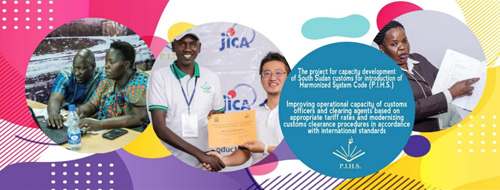
The project for Capacity Development of South Sudan Customs for Introduction of Harmonized System (HS) Code Phase 2 started in April 2020 aiming to strengthen capacity of customs management in line with international standards at major borders including Nimule by enhancing the functions of the HS unit, improving the operational capabilities of customs officers and clearing agents based on appropriate procedures and domestic tariff rates, and strengthening their capabilities related to Rule Of Origin, thereby contributing to the modernization of customs procedures. This project was partially a continuation of the Phase 1 which terminated in March 2019 that introduced HS Code to South Sudan Customs. The overall goal of the phase 2 project was to ensure customs clearance procedures were continuously modernized with international/regional standards.
Harmonized System code administered by World Customs Organization (WCO) is an internationally recognized system that is used by over 200 countries and territories around the world to classify products according to their nature, composition, and intended use. The HS code is essential for international trade as it allows custom officials to easily identify and classify goods ensuring that they are taxed correctly and comply with import and export regulations.
The project also introduced Rule of Origin (ROO) to South Sudan Customs which is an essential aspect of international trade that plays a crucial role in determining the eligibility of a product for preferential treatment. ROO specifies the country of origin of a product and is used to determine the tariff rates and other trade measures that apply to that product. The importance of ROO lies in its ability to prevent trade fraud and ensure that the benefits of trade agreements are enjoyed only by countries that are party to the agreement. The ROO suits South Sudan in its trade agreement with the EAC partner Countries. After the project introduced ROO in South Sudan, NRA established an ROO unit at the Customs HQs in Juba town.
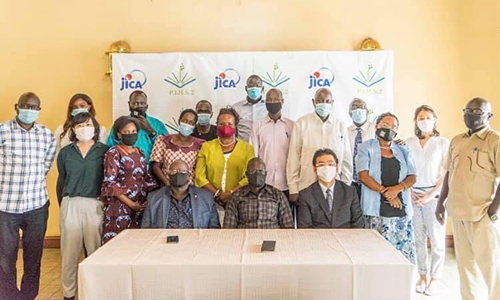
The three (3) years project which came to an end in March 2023 warrant the continuity and capacity enhancement of the HS units established in Juba International Airport, Customs HQs in Juba Town, and Nimule Border. Customs officers and clearing agents in main border points including Juba and Nimule in charge of customs clearance were able to impose appropriate customs tariffs and declarations using HS code. Additionally, capacity of the Customs Division related to Rules of Origin was enhanced.
All these achievements were made possible through cooperation with Uganda Revenue Authority (URA) and support to South Sudan Customs from other development partners such as Trademark East Africa (TMEA) who supported the One Stop Border Post (OSBP) phase 1 and are considering the feasibility of OSBP phase 2, East Africa Community (EAC) supporting regional integration of its member countries, United Nations Development Programme (UNDP) supporting the implementation of a scoping study of the customs system (a comparative analysis of 1. South Sudan own system, 2. ASYCUDA and 3. Other commonly procured customs systems)., International Monetary Fund (IMF) supporting the review of current South Sudan Customs procedures and suggest improvements, European Union (EU) African Development Bank (AfDB), African Union (AU) and World Customs Organization (WCO).
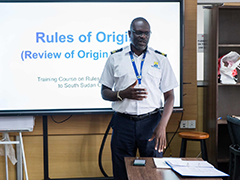
About 800 customs officers and clearing agents received trainings on several topics such as General Customs Matters including follow-ups, HS Training for customs officers and clearing agents in the major border points, Rule of Origin trainings for customs officers, OJT of SAD for customs officers and clearing agents of Nimule and Juba. Customs officers in Juba, Nimule, Wau and Renk received the trainings while clearing agents from Juba and Nimule also benefited from the HS trainings. The trainings were conducted in different venues including Juba, Elegu OSBP, Gulu and most of the trainings taking place at Uganda Revenue Authority (URA) HQs in Kampala and other trainings were conducted online connecting South Sudan, Uganda, and Japan
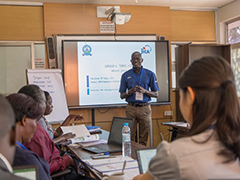
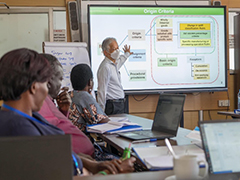
The project also organized two (2) Media Conferences to enlighten the people about its progress and achievements. The conferences were both face to face and online connecting people of South Sudan, Uganda, and Japan. The media conference was to raise awareness about the project and its goals, build credibility for the project and its partners to generate interest among potential stakeholders including investors, partners and the public as well as addressing concerns that may arise from the project.
The project for Capacity Development of South Sudan Customs for Introduction of Harmonized System (HS) Code Phase 2 also developed SMART SS HS APP that has made understanding HS code much easier for customs officers and clearing agents. An application to be used to check the latest South Sudan common external tariffs and for the customs officers and clearing agents to study their monthly assignment during the project period.
The application further contributes to improvement of customs declaration and customs modernization in South Sudan as it enables checking of South Sudan common external tariffs and HS code classification guidelines without an internet connection.
In a nutshell, the numerous achievements of the project have credited NRA with the ability to autonomously conduct HS and ROO trainings on its own given the big number of trained officials from the project. Specifically, there are teaching materials in addition tools to the well-trained Trainers of Trainees (ToT) to support on the job (OJT) training for other customs officers or new recruits SSNRA would hire in the future
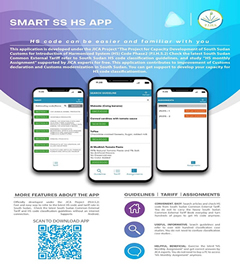
Conclusion
The project achievements as outlined above helped to lay foundation for a more modern and efficient customs system in South Sudan and it calls for commitment from the South Sudan National Revenue Authority to fully implement the necessary reforms. The government of South Sudan including development partners need to continue to invest in customs reform to ensure that the customs system is accountable and transparent. There is also needed to continue training customs officers and clearing agent on HS code and ROO in all border points and establishing HS and ROO Units.
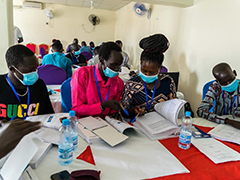
scroll